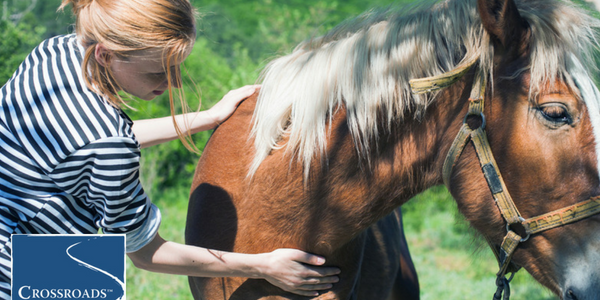There is not one blanket solution for treating drug addiction or helping someone learn how to overcome alcoholism. Each person’s situation is different, so a variety of methodologies and activities are used to address an individual’s needs. In addition to traditional types of treatment for drug addiction such as counseling, therapy, abstinence, and exercise, other methods such as equine assisted therapy can be beneficial as well.
While equine therapy is frequently associated with physical therapy, it can play an integral role in addiction recovery as well as PTSD recovery and other medical and mental health conditions. One main difference, however, is that in equine therapy for drug addiction, clients do not typically ride the horses. Older horses are often used that are retired from riding. Clients focus on their daily care instead which can help build confidence, self-esteem, trust, responsibility, and much more. There is a science behind equine therapy and how it stimulates brain-body connections and communication.
Horses are Responsive
Clients quickly notice during equine assisted therapy that horses are perceptive about emotions. They tend to mirror what the person is feeling, helping clients to be more reflective and aware of their own emotional health.
Quick Feedback
Horses also provide quick feedback. If the person is feeling frustrated or angry, the horse is more defensive and responds accordingly. You cannot bully a horse into doing something. However, if the person is relaxed and calm, the horse is more apt to be this way as well. Horses take a lot of cues from those around them, so getting them to cooperate requires building trust and communication.
Horses Don’t Judge
One of the great things about horses is that they are non-judgmental. While a client is struggling with how to overcome alcoholism and the choices they made in their past, the horse has no awareness or opinion about these things. They are focused on what is happening here and now.
A Unique Way to Build Confidence
Some clients find it easier to open up to a horse than to other people at first. Think of the relationship that many people have with their dog or cat; it can be the same with horses. They are great listeners and very aware of emotion. As clients develop trust with the horse, it can also build their confidence because such a large, powerful animal is responsive to their touch and commands.
Horses Help Build Responsibility
During equine therapy for drug addiction, clients are responsible for caring for the horses. This includes grooming, feeding, and exercising them. They learn how to meet the horses’ needs and develop routines. It can also create a sense of purpose because they know the horse is relying on them, and they have something to look forward to each session.
Taking Care of Yourself and Others
Clients can apply these skills in their own lives as well by practicing self-care, creating a schedule, and ensuring they are fueling their body and mind with what it needs for recovery. Learning to care for a horse can help them to treat themselves better and with more respect. The delicate relationship created between the client and the horse is also reflective of building relationships with others and learning how to communicate more effectively and develop trust.
It is amazing what a difference equine assisted therapy can make in recovery and self-discovery. While there are many different types of treatment for drug addiction, this is one that many clients respond to very well and end up getting a lot more out of than they initially thought. Bonding with horses can go a long way in teaching individuals in recovery about the importance of trust, health, cooperation, communication, and, above all, their responsibility for taking care of themselves. In exploring treatment options for drug addiction, consider a well-established, comprehensive program that includes equine therapy such as Crossroads. Learn more about how equine therapy is incorporated into treatment and can benefit clients by contacting Crossroads today.
[cta]Are you looking for a high-quality addiction treatment program that also integrates equine therapy into care? Contact Crossroads to learn more.[/cta]


















